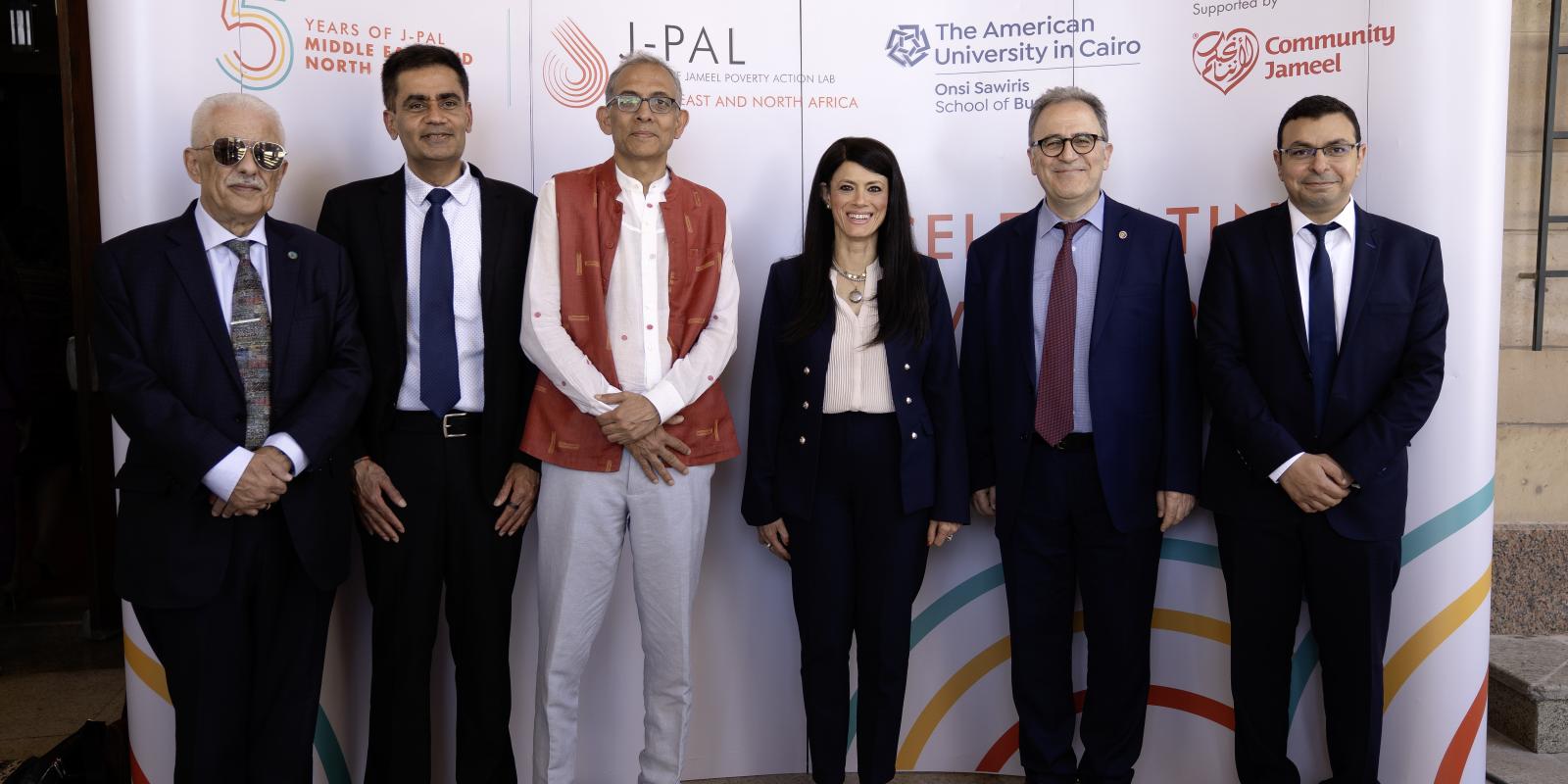
Celebrating Five Years of Transforming Policymaking: J-PAL MENA at AUC
The five-year anniversary celebration of the Abdul Latif Jameel Poverty Action Lab Middle East and North Africa (J-PAL MENA) marked a day that reflected exactly that: a celebration of evidence, innovation and partnership at the service of development.
At the Onsi Sawiris School of Business, we believe in the power of rigorous thinking paired with real-world action. What began in 2020—amid the uncertainties of a global pandemic—has grown into a regional force for impact. Today, J-PAL MENA supports governments and researchers across seven countries, helping translate data into decisions that improve lives.
Anchored in Partnership
The day commenced with reflections from the very people who helped bring J-PAL MENA to life. Ahmed Elsayed, executive director of J-PAL MENA, was joined by Laila Hosny, executive director of the Sawiris Foundation for Social Development and George Richards, director of Community Jameel. Together, they spoke of a shared vision rooted in trust and a commitment to outcomes—not just outputs.
Elsayed noted the regional momentum building around evidence-informed policymaking, especially in areas like youth employment and climate resilience. Hosny described the anniversary as not just a milestone, but as a reaffirmation of why the work matters. And Richards reminded us that rigorous research isn’t just about papers—it’s about improving the lives of millions by scaling what works.
A Turning Point for Public Policy
H.E. Dr. Rania A. Al-Mashat, Egypt’s minister of planning, economic development and international cooperation and AUC President Ahmed Dallal. Al-Mashat also spoke of a growing culture of evidence within Egypt’s policymaking, one that J-PAL MENA has helped shape. President Dallal echoed the sentiment, noting that while J-PAL launched in uncertain times, its purpose has only grown stronger, to generate knowledge that serves society.
Rethinking What We Know
A highlight of the day was the keynote address by Nobel Laureate and J-PAL Co-Founder Professor Abhijit Banerjee, who brought wisdom and humility to a challenging question: How do we turn research into lasting change?
Drawing on decades of fieldwork, Banerjee reminded us that good evidence often challenges what we think we know. Sometimes, it’s the smallest interventions—when timed right—that create the biggest ripple effects. From mentoring programs to service delivery tweaks, the lesson was clear: bold experimentation, paired with local insight, can reshape what’s possible.
He also touched on a deeper point. Evidence alone isn’t enough. Real impact comes from ecosystems—networks of trust among researchers, governments, and communities, working iteratively toward solutions that stick.
A Journey of Learning and Leadership
In a fireside chat titled The Journey to Five Years of J-PAL MENA, faculty and global partners reflected on lessons learned along the way. Moderated by Ahmed Elsayed, the session brought together Adam Osman, associate professor of economics, the University of Illinois Urbana-Champaign and co-scientific director, J-PAL MENA; Bruno Crépon, professor, ENSAE and École Polytechnique and co-scientific director, J-PAL MENA; Alison Fahey, global director of partnerships and strategic initiatives at J-PAL; and our own Samer Atallah, associate dean for graduate studies and research at the Onsi Sawiris School of Business.
The discussion reinforced that lasting change is built on relationships. Long-term partnerships with governments, universities and development actors create the conditions for research to become action. They also create space for local researchers to lead, shifting the center of knowledge production to where it matters most.
One key takeaway: the best research doesn’t just ask if something works, but how, for whom and in what context. As the conversation turned to the future, panelists emphasized the need for fresh thinking on challenges like climate adaptation and gender equity.
Voices from the Field
If data tells one kind of story, people tell another. In a segment called Voices: Stories of Impact, development practitioners and government partners reflected on how J-PAL MENA has helped shift mindsets and reshape systems.
Speakers Abdelrahman Nagy, lead evaluation specialist at International Initiative for Impact Evaluation (3ei); Medhat Massoud, former government official and senior advisor, J-PAL MENA; Reham Rizk, director of Egypt Impact Lab; Mohannad Hesham Abouelrouse, founder and CEO of Life From Water Foundation; and Noha Magdy, MENA Scholars Fellow, brought energy and candor to the conversation. They spoke of the “J-PAL mindset”, one that challenges assumptions, invites experimentation, and insists on asking hard questions.
Their reflections were a powerful reminder that good intentions don’t always lead to impact and that embedding evidence within institutions isn’t just a technical challenge, it’s a cultural one. When public servants become champions for evidence, they build the muscle for continuous learning and lasting reform.
Looking Ahead
In his closing remarks, Iqbal Dhaliwal, global executive director of J-PAL, offered a candid reflection on the state of development and the road ahead. With tighter budgets and greater scrutiny, the sector must be more focused than ever: scaling what works, discontinuing what doesn’t and staying grounded in evidence.
He spoke, too, of the promise and pitfalls of new technologies like AI. Used thoughtfully, AI can enhance targeting and reduce bias. But it must be implemented inclusively, evaluated constantly and always in service of human dignity.
Perhaps most importantly, Dhaliwal reminded us that the work of development is deeply human. Policies don’t change lives, people do. Champions inside systems, who believe in data and act on it, are the key to real, sustained transformation.
Over the past five years, J-PAL MENA has conducted over 60 randomized evaluations, working with partners across the region to test, learn and improve. With initiatives like the Egypt Impact Lab and the Hub for Advanced Policy Innovation for the Environment (HAPIE), the foundation is in place for the next chapter of evidence-based innovation.
As the anniversary celebration came to an end, the energy in the room was palpable. This was more than a retrospective; it was a recommitment to asking tough questions, sharing what we learn, and building partnerships that endure.
Together, we look ahead. Not only to the next five years, but to a future where data drives decisions, partnerships drive progress, and impact drives everything we do.
